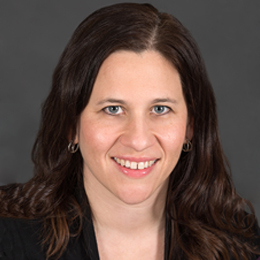
Director, Harvey Levy Program for Phenylketonuria and Related Conditions
Director, PAL (Phenylalanine Ammonia Lyase) Clinic
Attending Physician, Boston Children’s Hospital
Assistant Professor of Pediatrics, Harvard Medical School
Dr. Stephanie Sacharow is a medical geneticist experienced in the management of patients with a variety of genetic conditions and metabolic disease. She studied Neuroscience at Vanderbilt University prior to attending the University of Miami Miller School of Medicine, and later joining their faculty. Dr. Sacharow is board certified in Pediatrics, Medical Genetics and Medical Biochemical Genetics, and has been practicing over 15 years. She was involved with the implementation and execution of expanded newborn screening for metabolic disease for the South Florida region, and was director of the Cleft Lip and Palate team. Dr. Sacharow was also program director for the genetics training programs, and taught medical school and master’s level courses. Dr. Sacharow was recruited to Boston Children’s Hospital/Harvard Medical School in 2015.
Dr. Sacharow is the director of the Dr. Harvey Levy Program for Phenylketonuria and Related Conditions, and the medical director of the PAL clinic at Boston Children's Hospital. Dr. Sacharow is team member and provider for the BoLD Lysosomal Storage Disease Program. She has been involved in research studies with a focus on autism, genomic imbalances, inborn errors of metabolism and novel genes for rare disorders. Dr. Sacharow is currently principal investigator and co-investigator in multiple clinical trials for Phenylketonuria and Homocystinuria. She has expertise in the management of patients with pegvaliase (Palynziq), having been an investigator in the clinic trials leading the PAL clinic at Boston Children's Hospital, and co-author of the management guidelines for pegvaliase. She has been an invited speaker at national and international conferences to educate and share the BCH PAL program's experiences and practice improvements.

Director, Harvey Levy Program for Phenylketonuria and Related Conditions
Director, PAL (Phenylalanine Ammonia Lyase) Clinic
Attending Physician, Boston Children’s Hospital
Assistant Professor of Pediatrics, Harvard Medical School
Dr. Stephanie Sacharow is a medical geneticist experienced in the management of patients with a variety of genetic conditions and metabolic disease. She studied Neuroscience at Vanderbilt University prior to attending the University of Miami Miller School of Medicine, and later joining their faculty. Dr. Sacharow is board certified in Pediatrics, Medical Genetics and Medical Biochemical Genetics, and has been practicing over 15 years. She was involved with the implementation and execution of expanded newborn screening for metabolic disease for the South Florida region, and was director of the Cleft Lip and Palate team. Dr. Sacharow was also program director for the genetics training programs, and taught medical school and master’s level courses. Dr. Sacharow was recruited to Boston Children’s Hospital/Harvard Medical School in 2015.
Dr. Sacharow is the director of the Dr. Harvey Levy Program for Phenylketonuria and Related Conditions, and the medical director of the PAL clinic at Boston Children's Hospital. Dr. Sacharow is team member and provider for the BoLD Lysosomal Storage Disease Program. She has been involved in research studies with a focus on autism, genomic imbalances, inborn errors of metabolism and novel genes for rare disorders. Dr. Sacharow is currently principal investigator and co-investigator in multiple clinical trials for Phenylketonuria and Homocystinuria. She has expertise in the management of patients with pegvaliase (Palynziq), having been an investigator in the clinic trials leading the PAL clinic at Boston Children's Hospital, and co-author of the management guidelines for pegvaliase. She has been an invited speaker at national and international conferences to educate and share the BCH PAL program's experiences and practice improvements.
Journal article
CONCLUSIONS: These internationally relevant, evidence-based recommendations provide a structured framework for managing pegvaliase-related skin concerns. Adoption of this guidance may enhance treatment adherence, mitigate adverse events, and ultimately improve patient outcomes.
Journal article
Phenylketonuria (PKU) is an inherited metabolic disorder causing elevated phenylalanine (Phe) levels and neurocognitive impairment if left untreated. While dietary therapy remains the treatment standard, adherence declines during adolescence. Pegvaliase, an injectable enzyme therapy approved for adults > 18 years in the United States, lowers Phe levels while allowing dietary flexibility. This study examines pegvaliase use in adolescents, focusing on efficacy, discontinuation patterns, and...